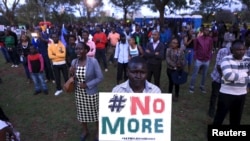The Kenyan government has attributed recent terror attacks in the country to the presence of Somali refugees at the sprawling Dadaab camps, a claim denied by the refugees.
Kenyan officials and security authorities have called for the Dadaab refugee camps in the country's north to be closed and its population sent back to liberated areas under the control of African Union forces and the Somali government.
Kenyan leaders have insisted Somalia's Islamist militant group, al-Shabab, uses refugee camps to train and plan attacks in the country.
Mohamed Olow Odowa, a security chairman at Ifo camp, one of the five camps in Dadaab, denied the charge, calling it an insult to the Kenyan government and its security apparatus.
Odowa, who is also the spokesman for the security committee of the Dadaab camps, noted that like any other town in the country, bad and good people visit the camps and the government must weed out the criminals.
President Uhuru Kenyatta's government is under pressure to do something about the worsening security situation.
In early April, fighters from al-Shabab stormed Garissa University College in northeast Kenya, killing 148 people, mostly students.
Local politicians have vowed to help the central government with information about militant group activities.
Hassan Mohamed, a young man living in Dadaab, said Kenyan political leaders are shifting the blame to refugees because there is no one to defend them.
"If you are a politician, the only [people] you can attack are the innocent - refugees, powerless and [those] who stay in muddy, dirty and dark areas. So as a politician you cannot say its me who is behind this but you have to say they are people who are living under you or under Kenya," Mohamed said.
In the recent attack on Garissa University, investigators revealed four of the attackers were Kenyans, one of them the son of a Mandera local chief, and two from western Kenya. Authorities said they believe the fourth was from the coastal city of Mombasa.
Some camp residents admit warring groups in Somalia take advantage of the desperate situation in the refugee camps and recruit young people.
Kamil Adan, an Islamic school teacher for more than 20 years in a Dadaab refugee camp, said many children are poorly educated and some of those return to Somalia.
"Somalis move freely a lot in and out of the country. Its possible when some people could not manage to get education and decided its better to go back and join either of the warring groups in Somalia. I cannot say its so, but when they go back they become what the people are in the country," Adan said.
Since December, more than 2,000 refugees have voluntarily returned to their countries and many more are registering with the UN refugee agency after facing huge pressure from the Kenyan government.




